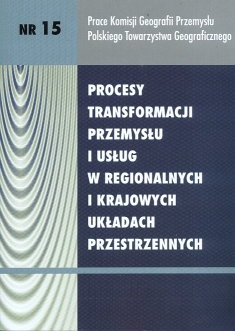Powiązania organizacyjne i właścicielskie przedsiębiorstw przemysłowych i usługowych w Polsce oraz ich znaczenie dla rozwoju regionalnego
DOI:
https://doi.org/10.24917/20801653.15.10Słowa kluczowe:
region, Polska, powiązania, przemysł, usługiAbstrakt
The article presents a study concerning the development of the network of ownership linkages for the Polish enterprises operating in the industrial and services sector. The analysis covered 1,200 largest enterprises operating in Poland in 2005, and for the purpose of the study the comprehensive data concerning the shareholding structure of those business entities - including details such as ownership, property and geography - were collected. The research indicates that there is a concentration of economic control function in the higher levels of the settlement hierarchy, which results in maintaining or even deepening the monocentric structure of the entire system, thus strengthening the process of economic polarization. From the point of view of regional development viewed in the light of national context this is a negative process. However, a much more beneficial situation is developing in regard to choosing the location for the local branches of major enterprises, where it can be asserted that the arrangements in this respect are well harmonized with the existing demographic potential. This fact must be perceived as a factor alleviating the excess of economic control function that is evident in the capital city of Warsaw. Also, at the same time this is an element that enhances accessibility to the highly-specialized services, as well as organization of economic regional structures in accordance with the current administrative-territorial division.Downloads
Bibliografia
Eberhardt P., 1986, Rejonizacja przedsiębiorstw zaopatrzenia, dystrybucji i handlu hurtowego w Polsce, Przegląd Geograficzny, 58, 4, s. 703–733
Friedmann J., 1967, A general theory of polarized development, Ford Foundation, Urban and Regional Development Advisory Program in Chile, Santo Domingo
Gadowska K., 2003, Zjawisko klientelizmu polityczno-ekonomicznego. Systemowa analiza powiązań sieciowych na przykładzie przekształceń sektora górniczego w Polsce, Wydawnictwo UJ, Kraków
Garrison W.L., 1959–1960, The Spatial structure of the economy, Annals of the Association of the American Geographers, I, II, III, 49, s. 238–248, 471–482, 50, s. 357–373
Kerr D., 1965, Some aspects of the geography of finance in Canada, Canadian Geographer, 6, 4, s. 175–192
Śleszyński P., 2008a, Duże przedsiębiorstwa w strukturze przestrzennej największych polskich miast, Prace Geograficzne, 217, Instytut Geografii i Przestrzennego Zagospodarowania PAN, Warszawa
Śleszyński P., 2008b, Ocena powiązań gospodarczych i kapitałowych między miastami, [w:] K. Saganowski, M. Zagrzejewska-Fiedorowicz, P. Żuber (red.), Ekspertyzy do Koncepcji Przestrzennego Zagospodarowania Kraju 2008–2033. Tom I, Ministerstwo Rozwoju Regionalnego, Warszawa, s. 335–391
Śleszyński P., 2007, Gospodarcze funkcje kontrolne w przestrzeni Polski, Prace Geograficzne, 213, Instytut Geografii i Przestrzennego Zagospodarowania PAN, Warszawa
Śleszyński P., 2002, Struktura i rozmieszczenie ośrodków zarządzania w polskiej gospodarce w 2000 r., Przegląd Geograficzny, 65, 2, s. 199–228
Wheeler J.O., 1988, Spatial ownership links of major corporations: The Dallas and Pittsburgh examples, Economic Geography, 64, 1, s. 1–16
Pobrania
Opublikowane
Jak cytować
Numer
Dział
Licencja
Artykuły publikowane są zgodnie z warunkami licencji Creative Commons (CC BY-ND 4.0; uznanie autorstwa-bez utworów zależnych).

